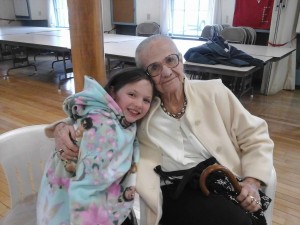Love So Amazing, So Divine, Part I
Rev. Thomas Cary Kinder
The Congregational Church of the United Church of Christ,
Bradford, Vermont
April 9, 2017
Sixth Sunday in Lent, Palm/Passion Sunday
Philippians 2:5-9; Matthew 21:1-11; Matthew 26:14-27:66
The final verse of “When I Survey the Wondrous Cross” contains the entire meaning of life:
Were the whole realm of nature mine,
That were a present far too small;
Love so amazing, so divine,
Demands my soul, my life, my all.
The whole realm of nature from the big bang to the baby born this morning does belong to someone. God gives us the world as a present, and God so loves the world that he gives us Jesus as a model of divine love in human form.
And Jesus calls us to love as he loves. This love, so amazing, so divine, is meant to move us to give our soul, our life, our all to the world in the same way God gave the whole realm of nature and life to us. This is the history and meaning of all life. The force of love and life and light exists and creates us in order to increase the continuous giving-and-receiving flow of love and life and light in the universe.
So where is this love, so amazing, so divine in today’s Passion story?
The traditional answer is “on the cross.” We were born to give ourselves in love, and Jesus exemplifies this.
He is not the only one in the story to do so. We see love wherever people were moved to give—a colt for Jesus to ride, a room to have his last supper. Joseph of Arimathea gave his tomb. Mary Magdalene gave her soul, her life, her all. We become part of the story, too, as we give our grief for this man who showed such love and tried so hard to get us to love one another, yet was hated for it and tortured to death. The grief we feel is part of the love in this story.
But there are other places where love so amazing, so divine, is harder to see. Judas betrays Jesus, Peter denies him, all the disciples desert him. Where is the love in that?
Our Healthy Communication Manual contains the wisdom we need to answer that question. At the bottom of the second page is a little paragraph that says, “Remember, anger is almost never the primary feeling—it will be fear or hurt that lies below the anger. And below that, it will be a threat to the person’s sense of connectedness—of belonging.”
Judas belonged to Jesus’ inner circle as treasurer, so he clearly was devoted to Jesus. If Judas was driven to betrayal by anger, below that anger was probably fear or hurt, and below that was probably a threat to his sense of being connected and belonging that made his love feel vulnerable.
Remember, Jesus had only recently started telling his disciples that he would be killed. Peter had rebuked Jesus for saying that. It was a deeply upsetting change.
Ron Edmonson is a pastor and church consultant. He has concluded from his work that resistance to change is human nature, and that underneath the anger or confusion or fear is always the sense that change will mean loss—loss of power or control, comfort or familiarity, tradition or stability, connection or belonging. Judas and Peter sensed the impending loss of a hope and dream that they had given their lives to pursue, that Jesus would be the Messiah and claim the throne of David and that they would help him make the world right.
This was love, for they so loved the world of Jesus that they feared change and loss. Judas and Peter were deeply hurt and afraid and confused.
That is where we end today. We end with the disciples scattered and mixed up, with their love leading them into this terrible lost place where they cannot see any glimmer of hope. We end with love so amazing, so divine that even hanging on the cross it can look down on the world that betrayed, deserted and denied it and love and forgive it.
Jesus loves us, even when we have our moments like Judas or Peter, even when we are part of the crowd crying out “Crucify him!” Love so amazing, so divine, loves us even at our worst. We cannot create the realm of God on earth as Christ calls us to do unless we love ourselves and one another as Christ does, even in our betrayals and desertions and denials. That is the most amazing, divine and powerful love. That love can change us and change the world.
We end on the last page of our Healthy Communication manual with forgiveness. The path to forgiveness begins with telling the story and naming the hurt and accepting that all humans including us are flawed, and yet God forgives and loves us to the end.
So the end is not the end. The story we heard today will never end. It is continuing as we struggle through a hard week toward something new that love is doing here to fulfill our wildest hopes and dreams.
Let us pray in silence…

